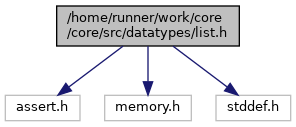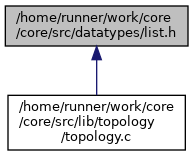List datatype.
More...
#include <assert.h>
#include <memory.h>
#include <stddef.h>
Go to the source code of this file.
|
| struct | list |
| | This structure defines a generic list. Nodes of the list must have a next/prev pointer properly typed. More...
|
| |
|
|
#define | my_offsetof(st, m) ((size_t)( (unsigned char *)&((st)->m ) - (unsigned char *)(st))) |
| | This macro is a slightly-different implementation of the standard offsetof macro.
|
| |
|
#define | list(type) type * |
| | Declare a "typed" list. This is a pointer to type, but the variable will instead reference a struct rootsim_list!
|
| |
| #define | new_list(type) |
| |
|
#define | list_sizeof(list) ((struct list *)list)->size |
| |
| #define | list_head(li) ((__typeof__ (li))(((struct list *)(li))->head)) |
| |
| #define | list_tail(li) ((__typeof__ (li))(((struct list *)(li))->tail)) |
| |
| #define | list_next(ptr) ((ptr)->next) |
| |
| #define | list_prev(ptr) ((ptr)->prev) |
| |
| #define | get_key(data) |
| | This macro retrieves the key of a payload data structure given its offset, and casts the value to double. More...
|
| |
| #define | list_empty(list) (((struct list *)list)->size == 0) |
| |
| #define | list_insert_tail(li, data) |
| |
| #define | list_insert_head(li, data) |
| |
|
#define | list_insert(li, key_name, data) |
| | Insert a new node in the list.
|
| |
| #define | list_detach_by_content(li, node) |
| |
| #define | list_pop(list) |
| |
| #define | list_trunc(list, key_name, key_value, release_fn) |
| | Truncate a list up to a certain point, starting from the head. More...
|
| |
|
#define | list_size(li) ((struct list *)(li))->size |
| |
List datatype.
A generic doubly-linked list
- Copyright
- Copyright (C) 2008-2022 HPDCS Group https://hpdcs.github.io
◆ get_key
Value: ({\
char *__key_ptr = ((char *)(data) + __key_position);\
double *__key_double_ptr = (double *)__key_ptr;\
*__key_double_ptr;\
})
This macro retrieves the key of a payload data structure given its offset, and casts the value to double.
◆ list_detach_by_content
| #define list_detach_by_content |
( |
|
li, |
|
|
|
node |
|
) |
| |
Value: do { \
__typeof__(node) __n = (node); \
__l = (
struct list *)(li); \
assert(__l); \
\
if(__l->head == __n) { \
__l->head = __n->next; \
if(__l->head != NULL) { \
((__typeof(node))__l->head)->prev = NULL; \
}\
}\
if(__l->tail == __n) {\
__l->tail = __n->prev;\
if(__l->tail != NULL) {\
((__typeof(node))__l->tail)->next = NULL;\
}\
}\
if(__n->next != NULL) {\
__n->next->prev = __n->prev;\
}\
if(__n->prev != NULL) {\
__n->prev->next = __n->next;\
}\
__n->next = (void *)0xBEEFC0DE;\
__n->prev = (void *)0xDEADC0DE;\
__l->size--;\
} while(0)
This structure defines a generic list. Nodes of the list must have a next/prev pointer properly typed...
Definition: list.h:18
◆ list_empty
| #define list_empty |
( |
|
list | ) |
(((struct list *)list)->size == 0) |
Given a pointer to a list, this macro evaluates to a boolean telling whether the list is empty or not.
- Parameters
-
| list | a pointer to a list created using the new_list() macro. |
◆ list_head
| #define list_head |
( |
|
li | ) |
((__typeof__ (li))(((struct list *)(li))->head)) |
This macro retrieves a pointer to the head node of a list.
- Parameters
-
| li | a pointer to a list created using the new_list() macro. |
◆ list_insert_head
| #define list_insert_head |
( |
|
li, |
|
|
|
data |
|
) |
| |
Value: do { \
__typeof__(data) __new_n = (data); \
__new_n->next = NULL;\
__new_n->prev = NULL;\
__l = (
struct list *)(li);\
assert(__l);\
if(__l->size == 0) { \
__l->head = __new_n;\
__l->tail = __new_n;\
}else{\
__new_n->prev = NULL; \
__new_n->next = __l->head;\
((__typeof(data))__l->head)->prev = __new_n;\
__l->head = __new_n;\
}\
__l->size++;\
} while(0)
◆ list_insert_tail
| #define list_insert_tail |
( |
|
li, |
|
|
|
data |
|
) |
| |
Value: do { \
__typeof__(data) __new_n = (data); \
__new_n->next = NULL;\
__new_n->prev = NULL;\
do {\
__l = (
struct list *)(li);\
assert(__l);\
if(__l->size == 0) { \
__l->head = __new_n;\
__l->tail = __new_n;\
break; \
}\
__new_n->next = NULL; \
__new_n->prev = __l->tail;\
((__typeof__(data))(__l->tail))->next = __new_n;\
__l->tail = __new_n;\
} while(0);\
__l->size++;\
} while(0)
◆ list_next
| #define list_next |
( |
|
ptr | ) |
((ptr)->next) |
Given a pointer to a list node, this macro retrieves a pointer to the next node, if any.
- Parameters
-
| ptr | a pointer to a list node. |
◆ list_pop
Value: do {\
size_t __size_before;\
__typeof__ (
list) __n_next;\
assert(__l);\
__size_before = __l->size;\
__n = __l->head;\
if(__n != NULL) {\
__l->head = __n->next;\
if(__n->next != NULL) {\
__n->next->prev = NULL;\
}\
__n_next = __n->next;\
__n->next = (void *)0xDEFEC8ED;\
__n->prev = (void *)0xDEFEC8ED;\
__n = __n_next;\
__l->size--;\
assert(__l->size == (__size_before - 1));\
}\
} while(0)
◆ list_prev
| #define list_prev |
( |
|
ptr | ) |
((ptr)->prev) |
Given a pointer to a list node, this macro retrieves a pointer to the prev node, if any.
- Parameters
-
| ptr | a pointer to a list node. |
◆ list_tail
| #define list_tail |
( |
|
li | ) |
((__typeof__ (li))(((struct list *)(li))->tail)) |
This macro retrieves a pointer to the tail node of a list.
- Parameters
-
| li | a pointer to a list created using the new_list() macro. |
◆ list_trunc
| #define list_trunc |
( |
|
list, |
|
|
|
key_name, |
|
|
|
key_value, |
|
|
|
release_fn |
|
) |
| |
Value: ({\
__typeof__(
list) __n_adjacent;\
unsigned int __deleted = 0;\
assert(__l);\
size_t __size_before = __l->size;\
\
if(__l->size > 0) {\
__n = __l->head;\
while(__n != NULL &&
get_key(__n) < (key_value)) {\
__deleted++;\
__n_adjacent = __n->next;\
__n->next = (void *)0xBAADF00D;\
__n->prev = (void *)0xBAADF00D;\
release_fn(__n);\
__n = __n_adjacent;\
}\
__l->head = __n;\
if(__l->head != NULL)\
((__typeof__(
list))__l->head)->prev = NULL;\
}\
__l->size -= __deleted;\
assert(__l->size == (__size_before - __deleted));\
__deleted;\
})
#define get_key(data)
This macro retrieves the key of a payload data structure given its offset, and casts the value to dou...
Definition: list.h:79
#define my_offsetof(st, m)
This macro is a slightly-different implementation of the standard offsetof macro.
Definition: list.h:28
Truncate a list up to a certain point, starting from the head.
◆ new_list
Value: __extension__({ \
void *__lmptr; \
__lmptr = malloc(
sizeof(
struct list)); \
memset(__lmptr, 0,
sizeof(
struct list));\
__lmptr;\
})
This macro allocates a struct rootsim_list object and cast it to the type pointer. It can be used to mimic the C++ syntax of templated lists, like:
#define list(type)
Declare a "typed" list. This is a pointer to type, but the variable will instead reference a struct r...
Definition: list.h:31
#define new_list(type)
Definition: list.h:39



